“I Finally Tried Fraxel” – Sherine Youssef
Many moons ago, when I was a newly minted beauty editor, my then-boss went out for a Fraxel session and came back to the office with a really raw, really red face. I was traumatised, and have since turned down every invite to try Fraxel, a laser treatment rumoured to be favoured by famous faces including Jennifer Aniston.
But a recent, ahem, milestone birthday – and a particularly stubborn pigmentation spot that no amount of vitamin A or C would erase – spurred me to put on my big-girl pants and book an appointment.
What is Fraxel?
There are three levels: Clear + Brilliant (AKA ‘baby’ Fraxel), Restore Dual, and Repair, the most intense.
I choose Restore Dual, a non-ablative (it doesn’t break the skin) and fractional laser (it treats fractions of the skin at a time) that causes microscopic thermal damage. This in turn kicks the skin’s natural repair processes into overdrive, which then expels damaged and discoloured cells and replaces them with fresh, healthy ones.
As the name Restore Dual suggests, the treatment involves two wavelengths: the first – 1927 nanometers (nm) – penetrates the superficial skin layers and targets pigmentation, pores, fine lines and uneven texture; while the second – 1550 nm – goes deeper and works on collagen production, tightening and wrinkles.
You can get both wavelengths in the same session, but I select the 1927 as I’m only looking at nuking my pigment spot. Next, the clinic (Skin Renu) email a set of pre-procedure instructions (including ceasing my beloved vitamin A for at least two weeks prior – sob!).
At the clinic, my face is smeared with anaesthetic cream and I pop two Panadol to take the edge off. After an hour, my face is numb and it’s showtime.
Jess, a senior dermal therapist at Skin Renu, passes the wand over each section of my face – cheeks, nose, forehead, chin – a total of eight times, and I feel a slight tingling, but it’s not at all unbearable (I think laser hair removal is more painful).
The whole thing takes about 30 minutes, after which Jess presses a couple of cold compresses onto my bright red face, coats it with sunscreen and gives me a detailed set of instructions.
For the next 48 hours, I’m to apply hyaluronic acid (which is hydrating, cooling and won’t trap heat) and niacinamide (to help minimise the possibility of post-procedure pigmentation, a potential side effect for my skin type). Then, during the “sloughing phase” (around days three to seven), I’m encouraged to apply a thicker balm or ointment and avoid the sun. If I have to go outside, she advises that I slather on sunscreen (plus mineral makeup if I must), and no picking at the dead skin.
The first night, my face is flushed and feels warm to the touch, and I cleanse very gently with cold water. The next morning, I wake up and my face is slightly swollen, but I’m told this should subside within the first two days, which it does.
By day three, it looks like I’ve applied a really awful muddy bronzer and there are tiny pixelated dots all over my skin, which has the texture and appearance of sandpaper. This is the part that freaks me out the most as I hate that rough sensation. The flaking and itching starts on day three, and the following day my skin starts shedding.
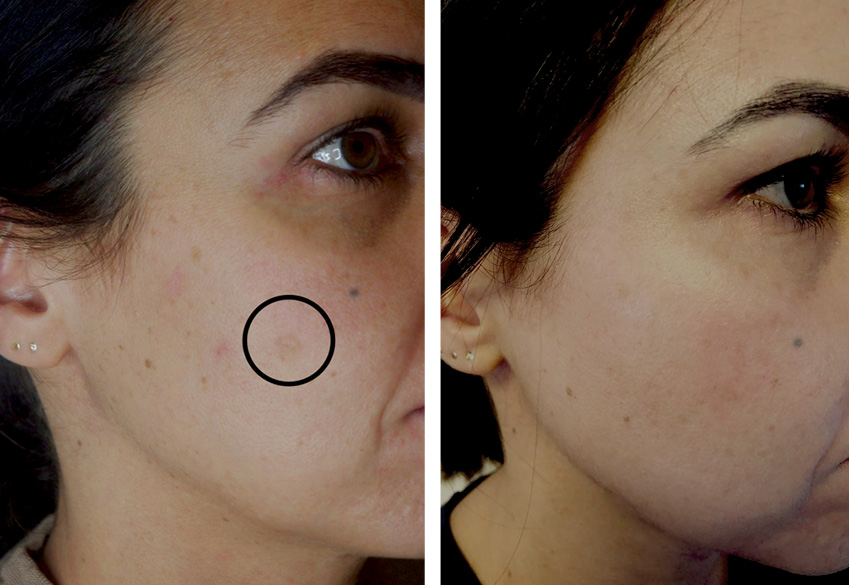
As instructed, I continue to apply the hyaluronic and niacinamide serums morning and night, but now I’m also layering Crème de la Mer moisturising cream over the top (this classic product is normally too heavy for me, but now my skin can’t get enough). I notice my facecloth is studded with those brown dots of dead skin, and by day seven, they’re all gone.
The results
I’m seriously impressed. My skin feels soft, and looks really smooth and even – and slightly pink (that’s the new skin!), some acne scarring on my chin is significantly reduced, and the pigmentation spot on my cheek is completely gone. I genuinely could not be happier and am mad that it took me so long to do this.
What else you need to know
If you’re treating pigmentation like mine, one or two sessions should do it, but you may need up to five treatments.
Sherine received Fraxel at Skin Renu. Pricing is one full-face session at $1200.
“I Tried A Keratin Straightening Treatment” – Lucy Adams
I’ve always thought of myself as a low maintenance beauty editor. I tint my own brows, do not like professional manicures and only colour my hair three times a year. I’m lucky though – my hair is fairly manageable. It’s neither curly nor straight – just in between – and if I have bad hair days I just pull it back into a bun or ponytail.
So, until recently I’d never been tempted by the hype around keratin treatments, which smooth and straighten hair.
Plus, I’d been led to believe that keratin treatments were only for thicker, more unruly hair, and heard that early versions of the treatment (also known as the Brazilian blow-dry) were laden with nasty chemicals.
But when I heard my fellow beauty ed pals raving about Goldwell Kerasilk Keratin Smoothing Treatment I couldn’t wait to get on board. Goldwell’s new treatment promised smoother hair (that still kept some natural movement) thanks to its half-silk protein and half-wool protein (sourced from New Zealand merino). But the best bit is it’s safe, you can tie it up and wash and wear it straight away unlike other versions where you need to keep your hair down, straight, dry and out for 72 hours.
Pre Covid-19 restrictions in early March, my stylist, Kayla, warned me that it was quite a lengthy process (two or three hours) but that it would last for three or four months. So, armed with my book, laptop and a backlog of podcasts, I settled in for an indulgent few hours at the salon.
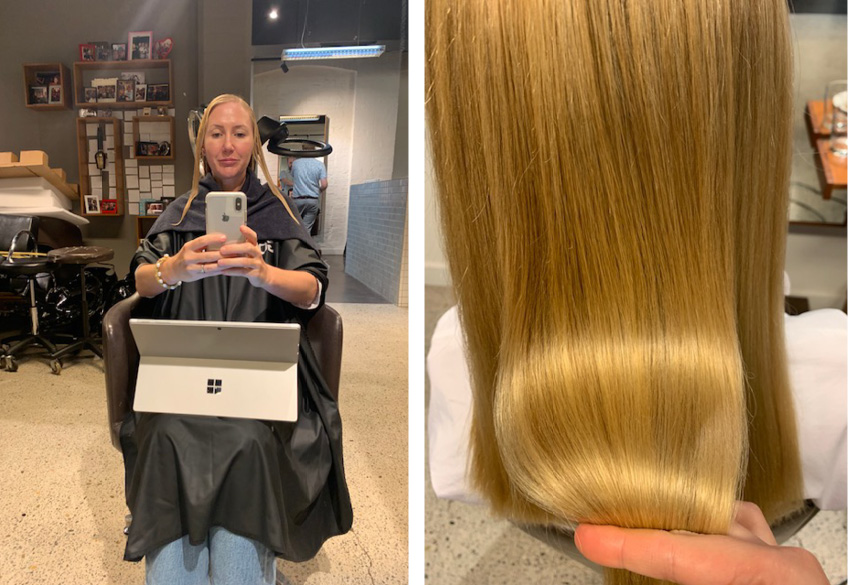
A mask-like solution was combed all through my hair piece by piece and then left to set for 15 minutes, before blasting dry and smoothing completely straight with a hot iron. I was expecting a strong chemical smell, but it was sweet and floral.
I could see the results almost immediately, coming back from the basin after washing out the straightened dried hair, Kayla just air dried my hair with her fingers (no brushes, styling product or irons) and the result was sleek, smooth and completely frizz free.
It looked like a professional blow-dry – minus brushes. While it looked a little too sleek and flat (especially at the crown) than I was used to, she assured me that after a week or two it would soften regain some bounce and body. And it did.
With the smooth, shiny benefits still evident months later, it’s made this low maintenance beauty editor realise that maybe sometimes its worth choosing a few high maintenance options to be low maintenance in the long run.
Lucy tried Goldwell Kerasilk Keratin Smoothing Treatment at Wildlife Hair Sogo in Surry Hills, NSW. Pricing is dependent on hair length and type approx. $250-$450. Consult your hairdresser when booking.
The Vampire Facial – Iantha Yu
When it comes to gory beauty treatments, you can’t go past a Vampire Facial, which is – yes – the treatment made famous by Kim Kardashian. (And this famous, bleeding selfie)
I’ve always been too squeamish to consider a treatment that involves vials of my own blood. But when Anna from PRIMER calls to ask if I’d test out a beauty treatment that always scared me, I realise I’m curious to see whether there are any real benefits (other than ‘likes’ on social media).
So I put my bravest face forward and book in at All Saints Skin Clinic, Sydney. The treatment began with the therapist taking a vial of blood from my arm, and then extracting the platelet-rich plasma (PRP) with a centrifuge.
This water-like plasma was then spread all over my face from a large syringe (and yes, it did run down my face and into my hair) and needled into my skin with a Dermapen, a hand-held device that features 12 tiny needles to puncture your skin.
There’s a method to the madness – skin needling works by stimulating collagen production, while the use of your own plasma can reduce redness and swelling.
As my main skin concerns were fine lines, dullness and hyperpigmentation, the length of my Dermapen needles were 1.5 millimetres long, which caused the skin on my nose to puncture and bleed… quick, get that selfie!. To my surprise, the pain factor was only 3/10, and I felt the most sensitivity around my hairline and temples.
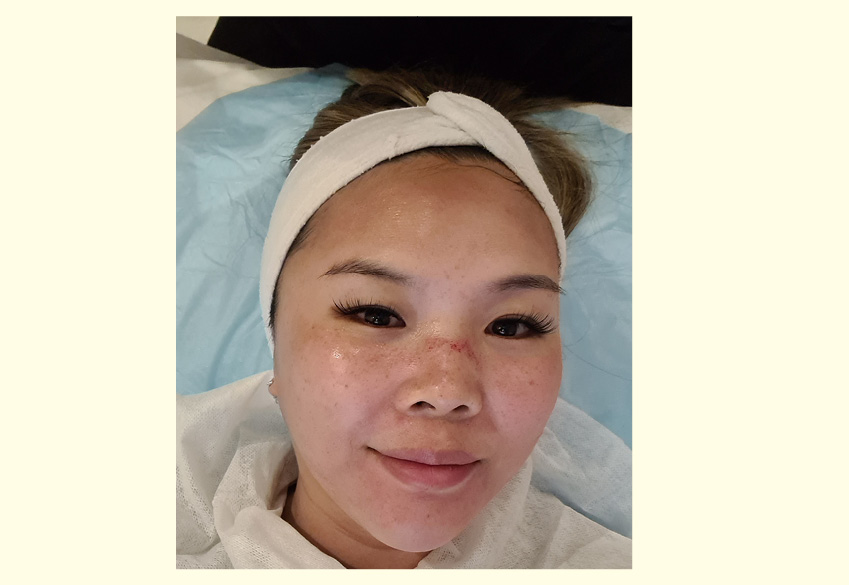
Straight after the treatment, my skin looked pink and felt sensitive – a little like a sunburn but nowhere near as red-raw as Kim. I met up with a friend straight after my appointment and she said that I just looked pink, like I’d gone for a run. However, after a few days, the redness had subsided to be replaced with light peeling and then a pleasing glow.
It’s recommended to have at least three treatments to see a noticeable difference, but I’ve already had a few friends point out how incredibly smooth my forehead is looking – which is definitely a success in my eyes. My verdict? The name is a lot scarier than it seems; I’m dying to go back for another treatment after seeing how luminous and smooth my complexion can really be.
Iantha tried a Vampire Facial At All Saints Skin Clinic. Pricing Starts at $550 for a single treatment.
All our writers received their treatments courtesy of the clinics. However, there was no obligation for the writers to give favourable reviews.




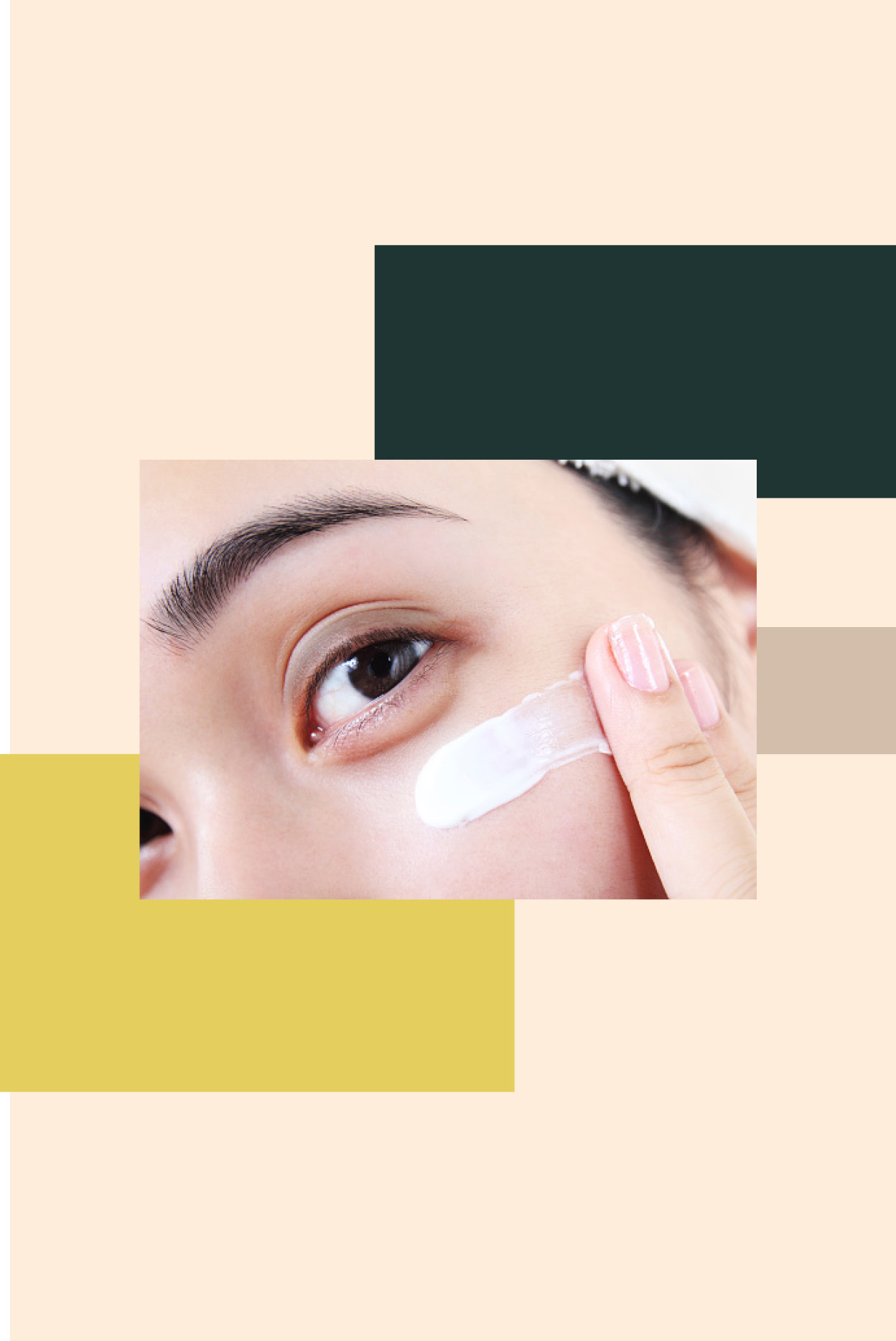

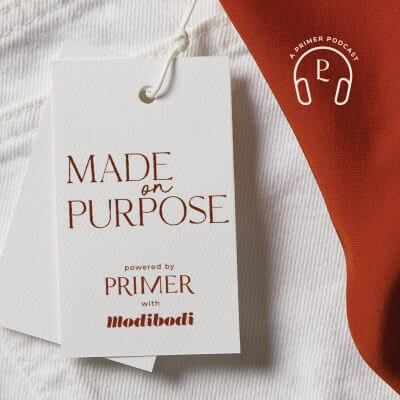
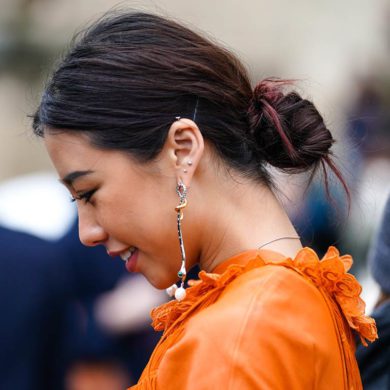
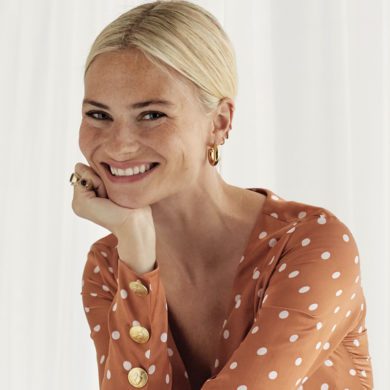
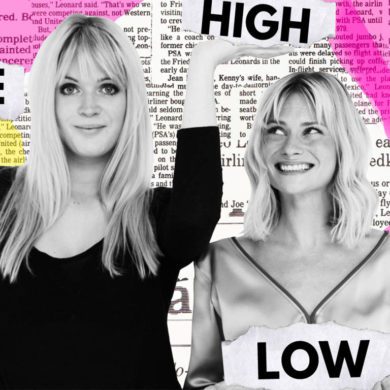

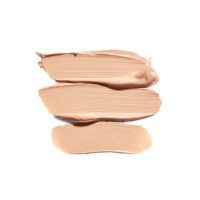
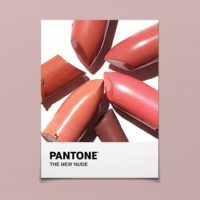
No Comments